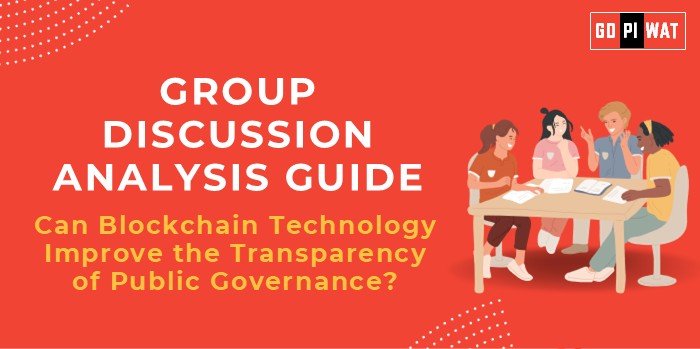📋 Group Discussion Analysis Guide: Can Blockchain Technology Improve the Transparency of Public Governance?
🌐 Introduction to the Topic
- 🌍 Opening Context: Blockchain, the technology underpinning cryptocurrencies, has moved beyond its financial roots to offer solutions in governance, supply chain, and healthcare. For public governance, it promises transformative transparency by creating immutable records and decentralizing decision-making processes.
- 📜 Topic Background: Blockchain, introduced through Bitcoin in 2008, has evolved into a distributed ledger technology with applications extending into governance. Governments worldwide, including those of Estonia and Dubai, are exploring its potential to minimize corruption, improve transparency, and foster public trust.
📊 Quick Facts and Key Statistics
- 📈 Global Blockchain Spending: $6.6 billion (2024) – A reflection of growing adoption across sectors.
- 🌐 Public Sector Blockchain Projects: 74 countries are experimenting with blockchain in governance.
- 📢 Blockchain for Transparency: 85% of global citizens demand more transparency in government operations (Transparency International, 2023).
- 🇮🇳 India’s Blockchain Use: Andhra Pradesh and Telangana lead in land record digitization via blockchain.
🏛️ Stakeholders and Their Roles
- 🏢 Government Bodies: Establish regulatory frameworks and implement blockchain solutions.
- 💻 Private Companies: Develop and deploy blockchain technology.
- 👥 Citizens: Benefit from increased transparency and reduced corruption.
- 🌍 International Organizations: Promote blockchain adoption through technical guidance and funding.
🏆 Achievements and Challenges
✨ Achievements:
- 📜 Land Records in India: Blockchain-based systems in Andhra Pradesh reduce fraud in property transactions.
- 🌟 Estonia’s E-Residency Program: Facilitates global access to government services securely using blockchain.
- 🗳️ Digital Voting: Blockchain-enabled voting trials ensure tamper-proof election results.
⚠️ Challenges:
- 💰 High Implementation Costs: Initial costs are significant, especially for developing nations.
- 📉 Scalability Issues: Current blockchain systems face challenges in handling large-scale operations.
- 🔒 Cybersecurity Risks: Blockchain is not immune to sophisticated attacks, such as 51% attacks.
🌍 Global Comparisons:
- ✅ Success: Estonia’s blockchain for healthcare and e-governance offers a role model.
- ❌ Challenges: Despite its potential, blockchain adoption in Africa remains low due to infrastructural constraints.
📖 Case Study: India’s adoption of blockchain in Telangana for land records has resulted in reduced disputes and improved efficiency.
💬 Structured Arguments for Discussion
- ✅ Supporting Stance: “Blockchain reduces corruption by ensuring immutable and auditable records, evident in its application in Estonia’s e-governance systems.”
- ❌ Opposing Stance: “Blockchain is energy-intensive and costly, making its large-scale implementation challenging for resource-constrained governments.”
- ⚖️ Balanced Perspective: “While blockchain ensures transparency, its adoption must be complemented with regulatory oversight and infrastructure development.”
💡 Effective Discussion Approaches
- 🎯 Opening Approaches:
- 📊 Statistical Hook: “With $6.6 billion spent globally on blockchain, its potential for governance is undeniable.”
- 📖 Case Study Start: “Telangana’s blockchain experiment demonstrates tangible benefits in land records.”
- 🛡️ Counter-Argument Handling:
- 🌟 “While blockchain faces scalability issues, hybrid models combining blockchain with traditional systems offer solutions.”
- 🌱 “The energy-intensive nature of blockchain can be addressed using eco-friendly algorithms like proof-of-stake.”
📌 Strategic Analysis of Strengths and Weaknesses
- 🌟 Strengths: Transparency, data integrity, enhanced trust.
- ⚠️ Weaknesses: High costs, lack of technical expertise.
- 🌟 Opportunities: Public-private partnerships, advancements in green blockchain.
- ⚠️ Threats: Cybersecurity vulnerabilities, resistance to change.
📚 Connecting with B-School Applications
- 💼 Real-World Applications: Explore blockchain for supply chain transparency or electoral reforms in capstone projects.
- 🗨️ Sample Interview Questions:
- 🌍 “How can blockchain combat corruption in public governance?”
- 🗳️ “Discuss the role of blockchain in transparent elections.”
- 📖 Insights for B-School Students: Focus on blockchain integration with AI for smart governance solutions.


